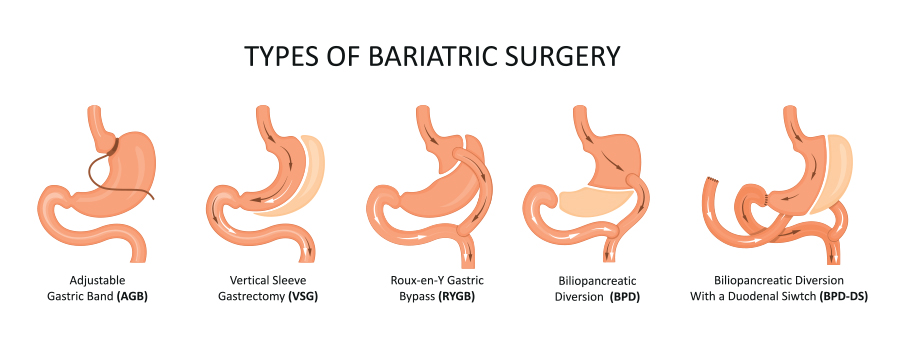Bariatric Surgery
Lifestyle Medical Centers is not affiliated with any bariatric surgical practices, but does work with patients considering bariatric surgery, and then after surgery to help with the nutritional and lifestyle factors critical to obtaining the best results from bariatric surgery.
What is bariatric surgery?
Obesity is a chronic medical condition that for many people is difficult to treat with diet and exercise alone. Obesity increases the risks for cardiovascular disease, type 2 diabetes, fatty liver disease, high blood pressure, and many other serious conditions.
Bariatric surgical procedures that restrict stomach size and/or alter your intestinal tract, are often a viable option for those with obesity when other interventions have proven ineffective. These surgical procedures may have the following benefits, especially when accompanied by a healthy diet, exercise, and personal support:
- Significant sustained weight loss
- Improved control of blood sugar (glucose) levels
- Reversal of type 2 diabetes
What are the different types of Bariatric Surgery?
There are several different bariatric surgical procedures designed to work by either restricting food intake, changing the way food is absorbed or metabolized, or both. Here is a look at some of the procedures:
- Laparoscopic Adjustable Gastric Banding (LAGB) reduces the opening to the stomach or stomach size.
- Biliopancreatic diversion (BPD) restricts the amount of calories and nutrients absorbed by the body.
- Roux-en-Y Gastric Bypass (RYGB) connects the upper stomach to the lower part of the small intestine so that food bypasses a large part of the gastrointestinal tract. It therefore has both a restrictive and malabsorptive component
- Sleeve gastrectomy (SG) removes a portion of the stomach, leaving a tube or sleeve through which food can pass.

Am I a good candidate for bariatric surgery?
The National Institutes of Health (NIH) created a list of criteria and guidelines to help medical professionals determine if an individual is a qualified candidate for bariatric surgery. Good candidates should:
- Have tried and failed other weight loss management regimens
- Be healthy enough for surgery
- Have a Body Mass Index (BMI) of 40 kg/m2 or higher (approximately 100 pounds overweight) or have a BMI between 35 and 40 with an obesity-related medical condition
Where can I get the support, education, and motivation I need to succeed with bariatric surgery?
Whether you are preparing for or have already had weight loss surgery, LifeStyle Medical Centers have a team of clinicians and registered dietitians eager to help you meet your weight loss and healthy lifestyle goals.

Before Surgery
LifeStyle Medical Centers’ team of clinicians and registered dietitians can help you lay a foundation of successful lifestyle habits that will better prepare you for bariatric surgery. We will assist you with:
- Starting your weight loss journey pre-surgery (helpful for the procedure and may be required by your surgeon or insurance company)
- Learning about possible nutrition-related risks and complications – and how to prevent them
- Introducing an eating pattern that will resemble post surgery needs
- Implementing eating habits that are unique to weight loss surgery patients
- Educating you on vitamin and mineral needs after surgery
We want you to be as prepared as possible for weight loss surgery so that the road to recovery and a healthier you is as smooth (and successful) as possible.
After Surgery
After your weight loss surgery, we will help guide you through the three diet phases: high protein liquid, soft foods, and solid foods. We’ll help you learn how to get the most nutrition out of your food choices in order to meet your special needs after surgery. Most importantly, we will build a meal plan that is tailored to your bariatric procedure, personal medical history, food preferences, and you!
Ready to get started?
Call us today @ (919)354-7077
Sources:
- Centers for Disease Control and Prevention, https://www.cdc.gov/.
- Mayo Clinic, https://www.mayoclinic.org/.
- Johns Hopkins Medicine, https://www.hopkinsmedicine.org/health.
- Cleveland Clinic, https://my.clevelandclinic.org/health/diseases.
